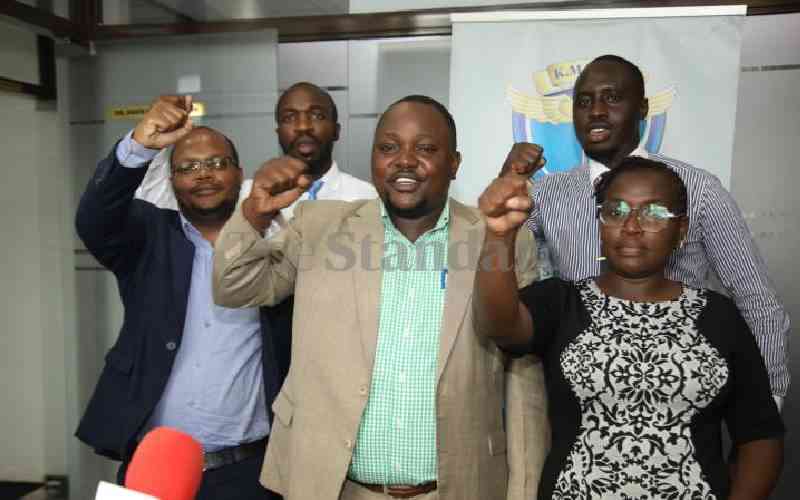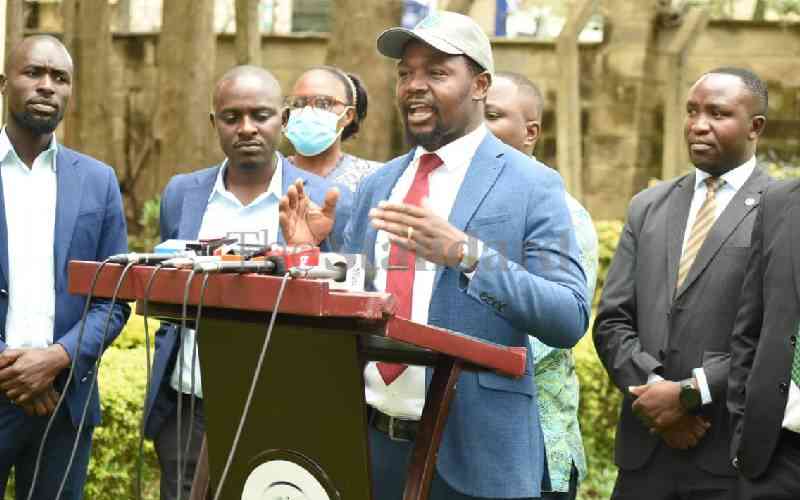 |
|
Health workers at Rift Valley General hospital in Nakuru during the strike Tuesday [PHOTOS: BONIFACE THUKU /STANDARD] |
By STANDARD TEAM
NAIROBI, KENYA: Striking health workers paralysed operations countrywide as the Government maintained that the crisis was beyond them.
Kenya Medical Practitioners, Pharmacists and Dentists Union Secretary General Sultani Matendechero vowed the strike would continue until their demands, which include retention of salaries under the national government, and enactment of the Health Act and Health policy, are met.
He said they want a Health Service Commission established to centrally address human resource functions and involve the unions in the development of policies and laws.
Matendechero has accused Health Cabinet Secretary James Macharia of playing politics with health matters.
“Macharia and Waiguru (Anne) are not being sincere with Kenyans. They performed an illegality by transferring the health functions without the legislations,” he said.
PREPARE TO LEAVE
But the cabinet secretaries faulted the union for calling the strike even after the Government had ceded some ground, including extending the handling of the payroll until February, 2014.
“There is absolutely no reason for the health practitioners to withdraw their services,” Waiguru said.
Central Organisation of Trade Unions Secretary General Francis Atwoli called on the Government to suspend the devolution of health services until proper legal frameworks and structures are put in place.
A spot check by The Standard at Mbagathi and Pumwani hospitals found that patients were left unattended as a majority flocked to Kenyatta National Hospital.
At the Nyeri General Hospital yesterday, all doctors and nurses downed their tools, paralysing operations at the region’s biggest referral facility.
Panicky relatives and friends of patients made drastic efforts to transfer them to private hospitals. Most of the hospital wards were empty as the ever-crowded casualty section remained deserted. Only a handful of casual workers, mostly cleaners, could be seen helping the sick and the elderly to pack their belongings to leave.
Benson Mwangi from Murang’a was in a dilemma about whether to transfer his wife to a private hospital, fearing that her condition could worsen in the process.
“She had an operation and the wound is still fresh. She is not able to sit up and I do not know what to do,” he said.
Stay informed. Subscribe to our newsletter
He urged the Government not to devolve the health services, saying more people were likely to die since county governments do not have the capacity to handle heath matters.
Elsewhere, the Kakamega Provincial General Hospital was closed indefinitely due to the strike.
“We were told yesterday night by the nurses that we should stay home today since they were not going to provide us with any services,” said Rosemary Imbiavala, a diabetes patient.
And the scope of human suffering at the Coast General Hospital in Mombasa was monumental as the strike kicked off. Although the hospital remained open, most wards were empty. Also affected were other public hospitals like Port Reitz, Tudor, Bamburi, Utange, Mlaleo, Mtongwe and Magongo, which were either closed or forced to operate at low capacity.
There was confrontation at the Rift Valley Provincial General Hospital in Nakuru after security guards stopped relatives from picking their patients from the facility. Some patients had to be lifted over the fence by fellow patients.
BEING IGNORED
In Kapsabet district, health workers shut the main gate to the hospital, leaving patients stranded.
“Kenya is sick at 50, we need Structures not Fractures,” read some of the placards they carried.
The health workers accused President Uhuru Kenyatta of ignoring their pleas.
They complained that devolution has been exclusive rather than inclusive, adding that their “valuable inputs” had been ignored.
Some of their concerns included the worry of infrastructural disarray on devolution, lack of fairness in salary payment structures, and poor supervision where the health workers are subjected to answering to many supervisors.
They also expressed fears of losing their pension through devolution.
“The health sector is being politicised. This is not advantageous to the people of Kenya who are the electorate. This is further endangering health service delivery,” said Paul Sang, the Kenya National Union of Nurses Chairman in Nandi County.
Patients in Kericho District Hospital were left unattended while mourners were also stranded at the hospital mortuary as attendants joined other health workers on the first day of the strike.
Borness Chemutai, admitted in the hospital with knee and chest pains, said she could not afford to move to a private hospital.
“My life is now in God’s hands,” Chemutai said.
In Bomet County, medical services at Longisa County Hospital were paralysed as early as 8am.
The situation was no different in Nyandarua and Laikipia counties.
—Report by Roselyne Obala, Rawlings Otieno, Nderitu Gichure, Alex Namuliro, Phillip Mwakio, Vincent Mabatuk, Rael Jelimo, Nikko Tanui, Adrew Mibei, James Munyeki, Peace Loise Mbae, Kenan Miruka, Lawrence Aluru and Rushdie Oudie
 The Standard Group Plc is a
multi-media organization with investments in media platforms spanning newspaper
print operations, television, radio broadcasting, digital and online services. The
Standard Group is recognized as a leading multi-media house in Kenya with a key
influence in matters of national and international interest.
The Standard Group Plc is a
multi-media organization with investments in media platforms spanning newspaper
print operations, television, radio broadcasting, digital and online services. The
Standard Group is recognized as a leading multi-media house in Kenya with a key
influence in matters of national and international interest.
 The Standard Group Plc is a
multi-media organization with investments in media platforms spanning newspaper
print operations, television, radio broadcasting, digital and online services. The
Standard Group is recognized as a leading multi-media house in Kenya with a key
influence in matters of national and international interest.
The Standard Group Plc is a
multi-media organization with investments in media platforms spanning newspaper
print operations, television, radio broadcasting, digital and online services. The
Standard Group is recognized as a leading multi-media house in Kenya with a key
influence in matters of national and international interest.










